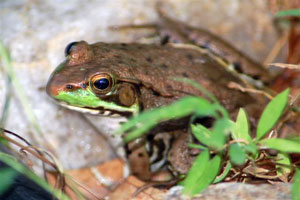 | asheville business & community directory |
|
This is an archived page that may contain outdated or incorrect information. Please visit www.Asheville.com for the latest news, events, and more.
 Identifying frogs and toads correctly takes a good pair of eyes�and ears.
Identifying frogs and toads correctly takes a good pair of eyes�and ears.
To help people identify and learn more about the frogs and toads calling from the woods, around ponds and wetlands and in their backyards, the N.C. Wildlife Resources Commission has available a new educational product, " The Frogs and Toads of North Carolina Field Guide and Recorded Calls." The 88-page field guide with CD, which sells for $15, features audio calls and 120 full-color photographs that beautifully illustrate the 30 frog and toad species native to North Carolina. Hear the screeching �release call� of the bullfrog. Find out what frog is considered the most beautiful in the state. Learn about the habitats and habits of the little grass frog, the smallest frog in North America. Detailed descriptions of each species simplify identification and range maps identify where they are found in the state. The fascinating frog facts will appeal to every aspiring herpetologist eager to learn more about these remarkable amphibians. Michael Dorcas, associate professor of biology at Davidson College and a well-known herpetologist, co-wrote the book with Jeff Beane, collections manager with the N.C. Museum of Natural Sciences, Steven Price, a research coordinator with Davidson College Herpetology Lab, and Sarah Cross Owen, a former herpetologist with the Wildlife Resources Commission. It was produced by the Wildlife Resources Commission�s divisions of Wildlife Management and Conservation Education. �We are fortunate to have so many fascinating species of frogs and toads in North Carolina,� Dorcas said. �We hope that this book will increase people�s appreciation of frogs and toads as important and valuable parts of our natural heritage.� Currently, the field guide and CD can be purchased four ways:
All proceeds from the sales of the field guide and CD will support Wildlife Diversity and conservation education projects and programs, such as the Calling Amphibian Survey Program (CASP) and Becoming an Outdoors-Woman�. (Images provided by the NC Wildlife Commission.)
|
